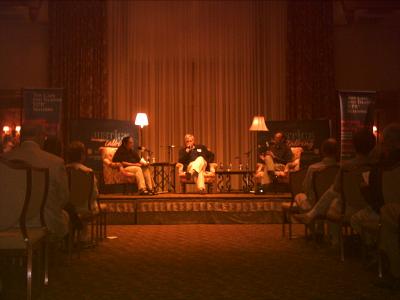Several days ago I got the chance to listen to Justice Talking tape a show here on Cape Cod. They were at the lovely Chatham Bars Inn (the first time I ever got my car parked for me). The show will air on the local NPR stations CAI/NAN on Sat, Aug 12 at 4pm.

The debate was over wind power in general, but this being Cape Cod, it didn’t take long for the debate to move over to Cape Wind.
First up was Robert Righter. A research professor of history at Southern Methodist University and a author of numerous books on environmental issues, including “Wind Energy in America: A history.” Frankly I was unimpressed with Mr Righter. He was obviously placed on the show to provide some sort of historical frame to the debate. Instead he sort of rambled on and on.
After Mr Righter was done, the real “debate” started. I say “debate” because it was more of a discussion. There was no set debate style rules as you would get in a political event. For the anti-wind side Jerry Taylor, senior fellow at the Cato Institute, and for the the pro-wind side John Passacantando executive director of Greenpeace USA and co-found of Ozone Action.
I was mostly amused by what Mr. Taylor said. He is clearly a libertarian style republican. He thinks that we should have no regulation, on anything, and that the sacred market will fix all problems. I was a little disappointed in Mr. Passacantando, he let several really easy to debunk things slide past him. He had a good grasp on the big picture of wind energy but lacked (or failed to display) knowledge of some of the more technical aspects that I thought would have made his point stronger.
The debate seemed to quickly degrade into the familiar cape wind debate. Anyone who has been living on Cape Cod knows at least some of the arguments pro and con regarding cape wind. Let me simplify it for you. One side doesn’t want the wind farm, they argue that it will ruin the sound, kill birds, wreck fishing, and if you press them, that they don’t like the way it might look. The other side wants the wind farm because they worry that global warming will ruin the sound, kill birds, wreck fishing, and they like the way it might look.
In the effort of total disclosure I have to say that I think the arguments against Cape Wind are very weak, and boil down to the view issue. I have some sympathy for these people, who doesn’t like seeing nature in all its pristine glory. However, as a young person I have to think about what the earth is going to be like in 50-100 years if we don’t start thinking about what we are doing to the planet. Our energy needs have to come from someplace, and oil and coal and nuclear seem to be worse options than solar, wind, tidal, geothermal, bio-fuels and small scale hydro.
The night was spent with the usual yahoo’s. The windstop.org guy was there and got SHUT DOWN by Mr. Passacantando. Mark Rogers and Charles Vinic were there, both had interesting soft balls to throw at there chosen debater. People asked questions and made statements. After they had lovely little things to eat that all tasted expensive. I scored some free buttons and books, and was lucky enough to talk with several of the speakers.
The real debate about wind energy on Cape Cod should boil down to two questions.
1. Do we continue to use electricity?
2. If so, how do we get it?
Question one is pretty easy to answer. We are going to continue to use electricity for the foreseeable future. Two is a little more difficult to answer.
I will be the first to tell you that wind energy has negative aspects to it. It only works when the wind blows, turbines can and do kill birds, if placed in the wrong spots they can cause navigation and travel issues. But if we are honest with ourselves will will see that the negatives of wind energy are far less negative than other energy options. With proper placement most of these problems go away. If we go with oil/gas we have to get it from some other nation, often hostile. We have to worry about global warming, oil spills, gas explosions, cancer, asthma, ocean acidification, and many other nasty things. If we use coal, we have all the same global warming issues as oil/gas (more so), but we also have to worry about mountain top removal, acid rain, cancer and even more asthma. If we go nuclear we have to worry about mining the uranium, moving it around, what to do with the nuclear waste, three mile island, Chernobyl, dirty bombs and a host of other questions about radiation cancer and other nasty problems.
Wind energy is not going to solve all of our problems, but it makes a grand first step towards solving these problems. We can use wind energy to prolong our supplies of cheap fossil fuels. Making our reserves last longer until we can figure out how to stop using them all together. In the short term wind energy can be matched with gas fired power plants so that when the wind is blowing we can turn down the gas plants, and when the wind stops we can turn the gas plants back up. We can combine wind with solar (its almost always windy when its not sunny, and sunny when its not windy). We can develop storage techniques to store energy from the wind to use when its not windy. We can use the experience gathered from near shore turbines to build deep water turbines.
In short wind energy wins this debate hands down.